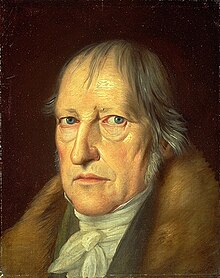
Back Georg Wilhelm Friedrich Hegel Afrikaans Georg Wilhelm Friedrich Hegel ALS ፍሬዴሪክ ሄግል Amharic Georg Wilhelm Friedrich Hegel AN جورج فيلهلم فريدريش هيغل Arabic ڭيورڭ ڤيلهيلم فريدريش هيڭل ARY جورج فيلهلم فريدريش هيجل ARZ হেগেল Assamese Georg Wilhelm Friedrich Hegel AST Georq Vilhelm Fridrix Hegel Azerbaijani
Georg Wilhelm Friedrich Hegel | |
|---|---|
 | |
| Kelahiran | 27 Ogos 1770 |
| Meninggal dunia | 14 November 1831 (umur 61) |
| Sekolah | Pengasas Hegelianisme |
| Institusi |
|
Kepentingan utama | Logik, falsafah sejarah, estetika, Agama, metafizik, epistemologi, falsafah politik |
Idea cemerlang | Idealisme mutlak, dialektik |
| Tandatangan | |

Georg Wilhelm Friedrich Hegel (Sebutan bahasa Jerman: [ˈɡeɔɐ̯k ˈvɪlhɛlm ˈfʁiːdʁɪç ˈheːɡəl], 27 Ogos 1770 – 14 November 1831) merupakan seorang ahli falsafah Jerman, salah seorang pencipta Idealisme Jerman.
Falsafah Hegel menjadi pengaruh banyak pemikir dan penulis dengan pendapat yang tersendiri.[1] Karl Barth menyatakan beliau sebagai "[setanding atau setaraf Thomas] Aquinas dalam kalangan orang Protestan"[2] manakala Maurice Merleau-Ponty pula menulis bahawa that "kesemua ide-ide falsafah terhebat dari kurun yang lepas—falsafah-falsafah Marx dan Nietzsche, fenomenologi, eksistensialisme Jerman dan psikoanalisis—dimulakan daripada Hegel."[3]
- ^ Kaufmann, Walter (1959). "The Hegel Myth and Its Method". From Shakespeare to Existentialism: Studies in Poetry, Religion, and Philosophy. Boston: Beacon Press. m/s. 88–119.
One of the few things on which the analysts, pragmatists, and existentialists agree with the dialectical theologians is that Hegel is to be repudiated: their attitude toward Kant, Aristotle, Plato, and the other great philosophers is not at all unanimous even within each movement; but opposition to Hegel is part of the platform of all four, and of the Marxists, too.
- ^ Barth, Karl (1959). Protestant Thought from Rousseau to Ritschl: Being the Translation Of Eleven Chapters of Die Protestantische Theologie im 19. Jahrhundert. Harper. m/s. 268.
Why did Hegel not become for the Protestant world something similar to what Thomas Aquinas was for Roman Catholicism?
- ^ Maurice Merleau-Ponty (diterjemahkan ke b. Inggeris oleh Herbert L. dan Patricia Allen Dreyfus), Sense and Nonsense, Northwestern University Press, 1964, m/s. 63.